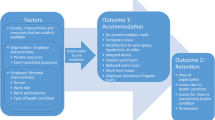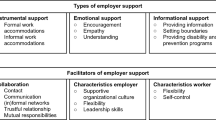Abstract
Historically, employment rates for people with disabilities have been low. Despite legislation that prohibits the discrimination of this group in work settings, employers are reluctant to hire people with disabilities. The purpose of this qualitative study was to explore the experiences of employers with workers with disabilities. Three focus groups were conducted with 21 administrators from three business sectors (i.e., healthcare, hospitality, and retail). Content analysis indicated five primary themes: (1) importance of disability employment agencies and disability advocates; (2) persistence of manager bias; (3) lack of promotion opportunities; (4) costs associated with having workers with disabilities; and (5) benefits associated with having workers with disabilities. Implications include the need for intervention studies that address the challenges experienced by individuals with disabilities, particularly during hiring and promoting phases of employment, and educational efforts to inform administrators and managers of the few costs and numerous benefits associated with having workers with disabilities.
Similar content being viewed by others
References
Blanck, P. D. (1996). Communicating the Americans with Disabilities Act, transcending compliance: 1996 follow-up report on Sears, Roebuck and Co. Iowa City: The Annenberg Washington Program in Communications Policy Studies of Northwestern University.
Bruyère, S. (2000). Disability employment policies and practices in private and federal sector organizations. Ithaca: Cornell University, Program on Employment and Disability.
Dixon, K. A., Kruse, D., & Van Horn, C. E. (2003). Restricted access: A survey of employers about people with disabilities and lowering barriers to work. John J. Heldrich Center for Workforce Development, Rutgers, The State University of New Jersey. http://www.heldrich.rutgers.edu/uploadedFiles/Publications/Restricted%20Access.pdf. Accessed December 13, 2007.
DuPont de Nemours and Company (1993). Equal to the task II: 1990 DuPont survey of employment of people with disabilities. Wilmington: DuPont de Nemours and Company.
Fabian, E. S., Luecking, R. G., & Tilson, G. P. (1995). Employer and rehabilitation personnel perspectives on hiring people with disabilities: Implications for job development. The Journal of Rehabilitation, 61(1), 42–49.
Gilbride, D., Stensrud, R., Vandergoot, D., & Golden, K. (2003). Identification of the characteristics of work environment and employers open to hiring and accommodating people with disabilities. Rehabilitation Counseling Bulletin, 46(3), 130–137.
Greenwood, R., & Johnson, V. A. (1987). Employer perspectives on workers with disabilities. Journal of Rehabilitation, 53, 37–45.
Harris Interactive Inc. (2004). National Organization on Disability/Harris Survey of Americans with Disabilities (Document Id. J20835A). New York: Harris Interactive.
Hernandez, B., Keys, C., & Balcazar, F. (2000). Employer attitudes toward workers with disabilities and their ADA employment rights: A literature review. Journal of Rehabilitation, 66(4), 4–16.
Job Accommodation Network (1999). Accommodation cost/benefit data. http://www.jan.wvu.edu/media/Stats/BenCosts0799.html. Accessed May 22, 2007
Johnson, V. A., Greenwood, R., & Schriner, K. F. (1988). Work performance and work personality: Employer concerns about workers with disabilities. Rehabilitation Counseling Bulletin, 32, 50–57.
McFarlin, D. B., Song, J., & Sonntag, M. (1991). Integrating the disabled into the work force: A survey of Fortune 500 company attitudes and practices. Employee Responsibilities and Rights Journal, 4, 107–123.
Miles, M. B., & Huberman, A. M. (1994). Qualitative data analysis: An expanded sourcebook. Thousand Oaks: Sage.
Morgan, D. L. (1997). Focus groups as qualitative research. Newbury Park: Sage Publications.
Oshkosh Area Workforce Development Center (2007). Studies related to the employment of individuals with disabilities, (1948–2000). Oshkosh: Oshkosh Area Workforce Development Center [Electronic version] (May 22).
Rehabilitation Research and Training Center on Disability Demographics and Statistics (2005). 2005 disability status reports. Ithaca: Cornell University.
Taylor, H. (2000). Conflicting trends in employment of people with disabilities 1986–2000. Rochester: Harris Interactive [Electronic version] (October 7).
Unger, D. D. (2002). Employers' attitudes toward persons with disabilities in the workforce: Myths or realities? Focus on Autism and Other Developmental Disabilities, 17(1), 2–10.
Wilgosh, L., & Skaret, D. (1987). Employer attitudes toward hiring individuals with disabilities: A review of the recent literature. Canadian Journal of Rehabilitation, 1, 89–98.
Acknowledgment
We extend our appreciation to Jay Rosen, Dan Schober, Anna Kushnir, and Jessica Ruiz. We also want to acknowledge the collaboration and commitment of disabilityworks, City of Chicago Mayor’s Office for People with Disabilities, Mayor’s Office of Workforce Development, and Chicagoland Chamber of Commerce to this work. Funding for this project was provided by the Illinois Department of Commerce and Economic Opportunity (DCEO). The opinions expressed here are those of the authors and not necessarily those of our collaborators or DCEO. Marielle Divilbiss is now at Kent State University.
Author information
Authors and Affiliations
Corresponding author
Rights and permissions
About this article
Cite this article
Hernandez, B., McDonald, K., Divilbiss, M. et al. Reflections from Employers on the Disabled Workforce: Focus Groups with Healthcare, Hospitality and Retail Administrators. Employ Respons Rights J 20, 157–164 (2008). https://doi.org/10.1007/s10672-008-9063-5
Published:
Issue Date:
DOI: https://doi.org/10.1007/s10672-008-9063-5




